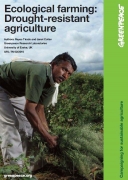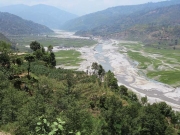Droughts and Floods
Saving rice - Ambitious plans to increase productivity
Posted on 24 Dec, 2010 10:13 AMEnormous funds are being poured into research aimed at improving seed varieties, with a heavy focus on developing hybrid rice. Is it the right option for millions of small rice farmers who are already battling high input costs and increasingly unpredictable weather? Or does part of the solution lie in efficient methods of cultivation that will cut down water use and improve yield?
Land acquisition for Renuka dam continues despite uncertainties - Press release from the Renuka Bandh Sangharsh Samiti
Posted on 21 Dec, 2010 12:24 PMForwarded to the portal by: Manshi Asher
Content Courtesy: Himvani
Author: Renuka Bandh Sangharsh Samiti
Despite protest against forced acquisition of land, Himachal Pradesh Power Corporation Limited (HPPCL) and revenue administration today notified Section 9 of the Land Acquisition Act 1894, for approximately 680 big has (about 57 hectares) of land of Panaar Village for the Renuka Dam Project. In a letter to the Chief Justice of Himachal Pradesh High Court sent today, activists appealed for a stay on land acquisition for the project, considering the uncertainty surrounding the project.
Ecological farming: Drought resistant agriculture – A paper by Greenpeace
Posted on 20 Dec, 2010 08:09 PM This paper by Greenpeace on ecological farming illustrates proven, modern farming approaches that help cope with drought. It elaborates on the drought-resistant crop varieties and calls for policy makers to increase funds for research on the system.
This paper by Greenpeace on ecological farming illustrates proven, modern farming approaches that help cope with drought. It elaborates on the drought-resistant crop varieties and calls for policy makers to increase funds for research on the system.
Human-induced climate change is resulting in less and more erratic rainfall, especially in regions where food security is very low. The poor in rural and dry areas will suffer the most and will require cheap and accessible strategies to adapt to erratic weather. This adaptation will need to take into account not only less water and droughts, but also the increased chance of extreme events like floods.
Biodiversity and a healthy soil are central to ecological approaches to making farming more drought-resistant and more resilient to extreme events. Practices that make soils better able to hold soil moisture and reduce erosion and that increase biodiversity in the system help in making farm production and income more resilient and stable.
Can India be firm with China on Brahmaputra dams ? - An article by Himanshu Thakkar
Posted on 20 Dec, 2010 02:34 PMForwarded to the Portal by: Himanshu Thakkar
Article and Image Courtesy: SANDRP
Author: Himanshu Thakkar
Chinese Premier Wen Jiabao’s forthcoming India visit (15-17 Dec 2010) provides another useful opportunity for India to be firm and forthright with China on India’s concerns about Chinese dam and hydropower projects on the shared rivers, including in the Brahmaputra basin. The importance of this issue cannot be underscored considering that this issue has been raised in the Parliament several times, even the Prime Minister has had to make clarifications in the recent past, the people and governments of several states, including Assam and Arunachal Pradesh have been agitated about this. India’s Planning Commission, Environment, Water Resources and Power Ministries have also been raising these concerns.
Mining - An increasing threat to our rivers - Article by Nitya Jacob
Posted on 20 Dec, 2010 12:29 AMContent Courtesy: Solution Exchange and Nitya Jacob
Author: Nitya Jacob
India’s arteries are choking. Her rivers, the lifeline of hundreds of millions, are over-taxed, polluted and encroached. They are being mined, dammed and emptied of water. Save for the four monsoon months, most rivers are streams of drains, depending on how many cities they pass through. This year people gaped in awe at the River Yamuna (I am sure they were over-awed by other rivers elsewhere too) as for the first time since 1978 looked like a river and not a drain.
From policy to practice - Koshi river basin management
Posted on 19 Dec, 2010 10:43 PM This document titled “From Policy to Practice” is a process documentation of Water and Energy Commission Secretariat (WECS) and World Wildlife Fund’s (WWF) joint initiative for the first field piloting of Integrated Water Resource Management (IWRM) approach as prioritized by the National Water Plan 2005 in Koshi River Basin, Nepal.
This document titled “From Policy to Practice” is a process documentation of Water and Energy Commission Secretariat (WECS) and World Wildlife Fund’s (WWF) joint initiative for the first field piloting of Integrated Water Resource Management (IWRM) approach as prioritized by the National Water Plan 2005 in Koshi River Basin, Nepal.
This pictoral document explains the effort to translate policy into practice by showcasing Koshi River Basin Management Program as a model for conservation and wise use of water and its resources to secure life and livelihoods of generations to come by addressing the impacts of climate change.
Water management across space and time in India – A working paper by the University of Bonn
Posted on 17 Dec, 2010 10:09 PMThis working paper by the University of Bonn attempts to give a spatial and temporal overview of water management in India. It traces how people and the successive regimes made choices across space and time from a wide range of water control and distribution technologies. The paper divides the water management in India into four periods –
- the traditional system of water management before colonial times;
- response from the colonial rulers to manage the complex socio-ecological system;
- large scale surface water development after independence; and
- finally, the small-scale community and market-led revolution.
Heavy rainfall, floods and drought affect life, agriculture and economy of the country - News Roundup (8-15 December 2010)
Posted on 17 Dec, 2010 12:22 AMReports over the last week indicate heavy rains and loss of lives and property in the state of Tamil Nadu, which has faced the maximum brunt of the rains followed by Kerala, Andhra Pradesh and some parts of Sikkim and Himachal Pradesh. Reports also indicate that there have been massive losses to agricultural produce due to heavy rains in parts of Tamil Nadu, Andhra Pradesh and because of droughts in the state of Orissa. At the same time, reports also indicate good news that there has been a rise in the water levels in the country and of attempts being made in different parts of the country to cope with floods and excessive rains in the future.
Rainfall
Tamil Nadu
- Tamil Nadu: The north-east monsoon, 50 per cent in excess in the State, claims over 200 lives and destroys crops and infrastructure
- After the deluge: Chennai has received 71 cm of rain during this year's northeast monsoon, leaving the roads in the Chennai Metropolitan Area in shambles
- The rain-hit north and south Chennai, Tamil Nadu get some respite even as several areas, including Velachery and Taramani, remained under a sheet of water, affecting hundreds of people
- Rain stops, but no end to woes for people from Chennai, Tamil Nadu
- Rain pours non-stop misery in Tamil Nadu
- 2,000 people rescued from low-lying areas along river Tamirabarani, in Kanyakumari district
- Torrential rain kills over 200 in Tamil Nadu
- 70 % excess rainfall in Cuddalore district, Tamil Nadu
Embankments related compensation to drain Indian exchequer : Need to review the flood control policy of the Government
Posted on 16 Dec, 2010 03:14 PMGovernment of Nepal has asked the Government of India to compensate its citizens badly affected by embankments and other flood control measures taken on river Gandak. Will this not lead to a flood of demands for compensation by the victims of similar problems in other river basins like the Bagmati, the Kamala and the Kosi?
Drought 2009: Overview and management – A report by the Ministry of Agriculture
Posted on 16 Dec, 2010 09:39 AMThis document on the management of drought during 2009 published by the Department of Agriculture and Cooperation of the Ministry of Agriculture presents the deficiency and erratic behavior of rainfall, impact of drought, mitigation efforts initiated and their results. During the deficient and erratic rainfall of South-West monsoon 2009, fourteen States declared drought/ drought like situation/ scarcity in 338 districts of the country.




